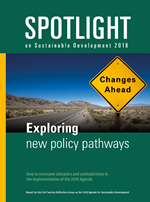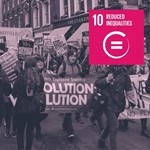Published on Fri, 2018-07-13 00:00
The High-level Political Forum, United Nations central platform for follow-up and review of the 2030 Agenda for Sustainable Development and the Sustainable Development Goals. You will find here the information of Social Watch participation in the framework of the HLPF 2018. |
Published on Thu, 2018-07-12 11:47
Exploring new policy pathways: How to overcome obstacles and contradictions in the implementation of the 2030 Agenda Jointly organized by Arab NGO Network for Development, Center for Economic and Social Rights, Development Alternatives with Women for a New Era, Public Services International, Global Policy Forum, Society for International Development, Social Watch, Third World Network with support from Friedrich-Ebert-Stiftung. The world is off-track in terms of achieving sustainable development. Fundamental policy changes are necessary to unleash the transformative potential of the SDGs. In particular, there is a need for more coherent fiscal and regulatory policies and a whole-of-government approach towards sustainability. |
Published on Thu, 2018-07-12 11:47
The private sector plays a significant role in achieving the SDGs of the 2030 Agenda for Sustainable Development. Several corporations have already pledged their support for the SDGs or evaluated the relevance of SDGs in their business activities. The UN Global Compact has started a global campaign to celebrate business leaders who are taking action to advance the 2030 Agenda. In many countries, engaging the private sector in SDG implementation is part of official policy. Governments and the UN are seeking increased commitment from the private sector in order to finance SDG implementation and bring growth to their economies. Many governments expect the involvement of companies in SDG implementation to lead to greater social and environmental awareness in business strategies. |
Published on Wed, 2018-07-11 14:20
HLPF Side Event – Wednesday, July 11, 18:30-20:00 – UNHQ CR4 |
Published on Wed, 2018-07-11 09:18
The UK Government committed to reducing inequalities through Sustainable Development Goal 10. Three years later things aren’t on track but is the socio-economic duty the solution we need? Koldo Casla from Just Fair explains. By signing up to the Sustainable Development Goals (SDGs) in 2015, among other things, the UK Government committed to reducing inequalities. The SDGs, with their 17 Goals and 169 Targets, set the world on a trajectory where we have eradicated poverty, reduced inequalities, halted the loss of biodiversity and combatted catastrophic climate change. Some call them an action plan for the world. But as our chapter on SDG 10 in Measuring up shows, three years later the UK’s chances of hitting the targets on reducing inequalities by 2030 are not looking too good. |
SUSCRIBE TO OUR NEWSLETTER







